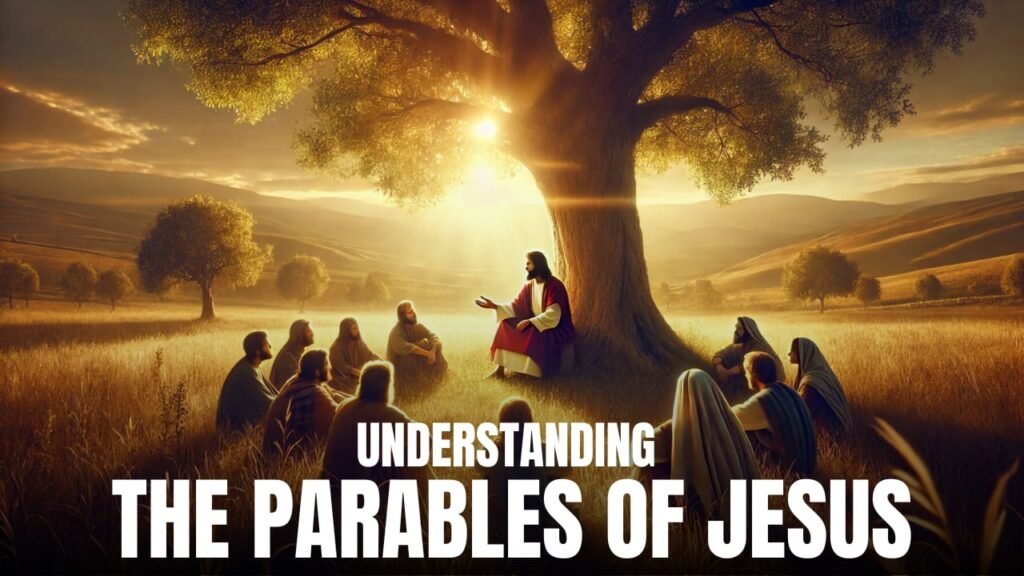Praise the Lord Everyone,
Introduction
Understanding the Power of Parables
The Parables of Jesus are some of the most profound and impactful teachings in the Bible. Through these simple yet powerful stories, Jesus conveyed deep spiritual truths about the Kingdom of God, faith, love, and righteousness.
Parables use everyday situations and relatable characters to illustrate divine principles, making them accessible to all.
In this blog, we will explore:
✅ The significance of parables in the Bible
✅ Key parables and their lessons
✅ A complete list of Jesus’ parables for further study
1. What Are the Parables of Jesus?
Definition of a Parable
A parable is a short story with a spiritual or moral lesson. Jesus often used parables to teach His disciples and the crowds following Him.
Unlike direct teachings, parables require reflection and an open heart to understand their deeper meaning.
Why Did Jesus Teach in Parables?
In Matthew 13:10-11, the disciples asked Jesus why He spoke in parables. He replied:
📖 “Because the knowledge of the secrets of the kingdom of heaven has been given to you, but not to them.”
👉 Jesus used parables to reveal truths to those willing to listen while hiding them from those with hardened hearts.
👉 Parables invite us to seek God’s wisdom and reflect on our spiritual journey.
2. Key Parables in the Bible
The Parable of the Good Samaritan (Luke 10:25-37)
One of the most well-known parables in the Bible, this story teaches about love and compassion.
🔹 A man traveling from Jerusalem to Jericho is attacked by robbers and left half-dead.
🔹 A priest and a Levite pass by without helping.
🔹 A Samaritan, despite cultural differences, stops to care for the injured man, takes him to an inn, and provides for his recovery.
Lesson from the Parable:
✔ Jesus teaches that loving our neighbor means showing mercy to everyone, regardless of race, religion, or social status.
✔ True love is action, not just words.
The Parable of the Sower (Matthew 13:1-23)
This parable illustrates how people receive God’s word differently, using the example of a farmer scattering seeds:
1️⃣ The Path – The seed is eaten by birds, representing people who hear God’s word but do not understand it.
2️⃣ Rocky Ground – The seed sprouts quickly but withers because it has no roots, symbolizing those who accept God’s word but fall away during hardships.
3️⃣ Thorny Ground – The seed grows but is choked by weeds, representing people distracted by life’s worries and wealth.
4️⃣ Good Soil – The seed produces a harvest, symbolizing those who hear and apply God’s word in their lives.
Lesson from the Parable:
✔ Our hearts must be like good soil—open and receptive to God’s word, allowing it to take root and bear fruit.
The Parable of the Prodigal Son (Luke 15:11-32)
This story reveals God’s amazing grace and love for His children:
🔹 A younger son asks for his inheritance, wastes it on reckless living, and ends up in poverty.
🔹 Realizing his mistake, he returns home, hoping to be a servant.
🔹 His father welcomes him back with open arms, celebrating his return.
🔹 The older son, who remained faithful, resents the father’s generosity.
Lesson from the Parable:
✔ God’s love is unconditional. No matter how far we stray, He is always ready to forgive and restore us when we repent.
3. List of Jesus’ Parables for Further Study
Here is a list of Jesus’ parables to study and reflect on:
Parables About Love and Compassion
✅ The Parable of the Good Samaritan (Luke 10:25-37)
✅ The Parable of the Lost Sheep (Luke 15:3-7)
✅ The Parable of the Prodigal Son (Luke 15:11-32)
Parables About Faith and Growth
✅ The Parable of the Sower (Matthew 13:1-23)
✅ The Parable of the Mustard Seed (Matthew 13:31-32)
✅ The Parable of the Talents (Matthew 25:14-30)
Parables About Forgiveness and Mercy
✅ The Parable of the Unforgiving Servant (Matthew 18:21-35)
Parables About the Kingdom of God
✅ The Parable of the Wedding Feast (Matthew 22:1-14)
✅ The Parable of the Ten Virgins (Matthew 25:1-13)
✅ The Parable of the Rich Fool (Luke 12:16-21)
Each of these parables covers different aspects of Christian life, such as faith, forgiveness, humility, and preparedness for Christ’s return.
4. How to Apply the Parables in Daily Life
1. Read and Reflect
📖 Take time to read a parable and ask yourself, “What is Jesus teaching me through this story?”
2. Pray for Understanding
🙏 Ask God for wisdom to understand His Word and apply it to your life.
3. Live Out the Lessons
💡 The parables teach us to love, forgive, and live righteously. Apply these principles in your relationships and daily actions.
4. Share with Others
📢 Just as Jesus used parables to teach, we can share these stories to encourage and inspire others in their faith.
Conclusion: The Power of Jesus’ Parables
The Parables of Jesus are timeless lessons that reveal the heart of God.
Whether it is the Parable of the Good Samaritan, the Parable of the Prodigal Son, or any other parables in the Bible, each story carries a powerful message of love, faith, and obedience.
By studying these parables, we gain deeper insights into God’s Kingdom and how we should live as His followers.
📌 Let us continue to seek wisdom, apply these teachings, and share God’s truth with the world.
Praise the Lord
✨ God bless you all.

 JOIN HANDS IN BUILDING GOD’S KINGDOM
JOIN HANDS IN BUILDING GOD’S KINGDOM 

